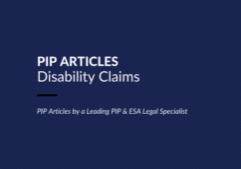Can you study while on PIP?
There are two aspects to this, what the rules say about combining studying and receiving PIP, and then there are the practicalities and implications of combining the two.
If you are a student whose accommodation costs are wholly or partly met from a student grant or loan, or from a grant made to an educational institution, under regulation 28(2)(f) of the 2013 Regulations, then you are exempt from the rules about payment of the daily living component of PIP being suspended after being in a care home for 28 days.
There is no bar on receiving either component of PIP while studying full or part-time. We have dealt with enough PIP appeals involving students to know that the assessors and DWP decision makers will readily make assumptions about a student’s ability to walk, prepare food safely, to pay bills reliably, to see and hear, to think, to travel, to attend meetings with tutors and to generally organise themselves.
We are generally brought in when things have gone wrong and the client has had a decision that they believe is wrong. The contents of an assessment carried out by the college or university can be helpful. We would look at GP records, tutor assessments and take statements from house mates, tutors and other professionals, as well as family and friends.
Better still, recognise that these issues are likely to arise and approach us at the claim stage, so that the chances of having to cope with the stress of a wrong decision can be reduced. It could easily take over a year from beginning a claim to receiving arrears from a successful PIP appeal. During that time, you are likely to have no award at all. Importantly, this is your benefit and ideally, it is you who should have the payments, rather than a significant portion of them being paid to us in legal costs.
We identify where you should score points, and why you should score them. We can help you to appreciate where the DWP are likely to see a ‘conflict’ between your stated difficulties and what they believe your everyday life involves. These might be dealt with ‘head-on’ in the form content, making a misunderstanding less likely. We can talk to you about potential sources of supporting evidence to go in with the claim. We always go through the medical and other evidence brought to us by a client, because we have seen examples of appeal prospects being ruined by something sent in by the client before we became involved. In some cases, the advice to those clients has been that they will not achieve the outcome due to them because the damage is too great, so that the appeal has had to be abandoned and the client has lost out on the arrears. The best way forward for them has been to begin again, distancing themselves from the misleading negative evidence.


 PIP assessment points
PIP assessment points